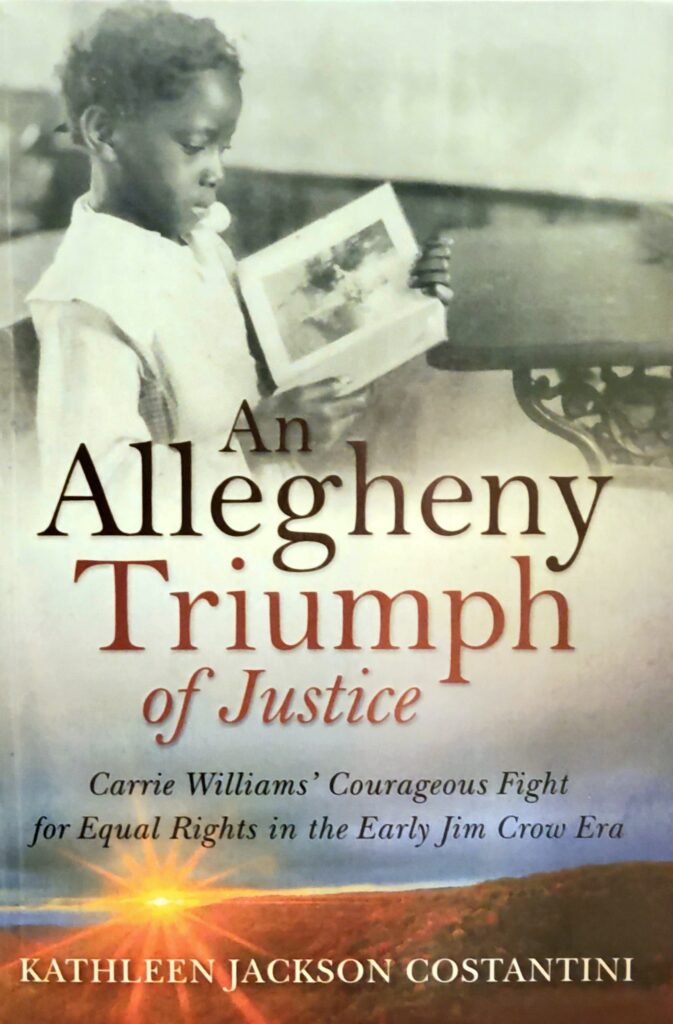
An Allegheny Triumph of Justice, Carrie Williams’ Courageous Fight for Equal Rights in the Early Jim Crow Era is a celebration of a true American hero. Carrie Williams, the African American teacher at the Coketon Colored School in Tucker County, West Virginia in the 1890s, bravely confronted an attempt to rob black children of their educational rights. Her story is set within the burgeoning Jim Crow era that legally sanctioned black second-class citizenship in the post Reconstruction period and beyond.
“This very readable book brings an often forgotten but very important case to light. It certainly belongs in every American academic law library, as well as in every high school, college and university library. It would also be an excellent textbook in high school civics classes and college civil rights courses.” Mark Podvia, West Virginia University College of Law Librarian and Editor of Unbound: A Review of Legal History and Rare Books Journal of the Legal History and Rare Books Series Interest Section of the American Association of Law Libraries. (Volume 11, no.2, 2019) www.aallnet.org/lhrbsis/resources-publications/unbound.
This is Carrie’s story, a true American heroic narrative.
In 1892 when Carrie received her teaching contract, a contract that as an austerity measure shortened the school term for African American children to five months while retaining an eight-month calendar for white children, she resolved to fight this inequity despite possible adverse consequences for herself and her family. Amid these racially charged times when African Americans experienced meager legal success, Carrie courageously challenged the all white Tucker County Board of Education’s mandate. Her battlefield was a courtroom and her champion was John Robert Clifford, the first African American lawyer admitted to the bar in West Virginia. Her struggle demonstrates courage, strength, and perseverance as she successfully eradicated an injustice to the African American children in Coketon and ultimately throughout the entire state.
Although the drama of Carrie’s successful litigation occurs in West Virginia, the multifaceted issues inherent in her struggle belong to the country as a whole, providing greater insight into the nation’s ongoing exploration of what it means to be the Great American Experiment. In many ways, the early history of West Virginia uniquely mirrors the larger social, economic and legal struggles that the United States experienced in this time period as the country grappled with the legacy of slavery and the rapid industrial development of the post Civil War period. When Carrie Williams sued the Board of Education, she challenged not only racial injustice, but also the far-reaching corporate power that the Davis Coal and Coke Company exerted in the county and throughout the state of West Virginia. A deeper understanding of the historical context of the fast changing American landscape of this era heightens an appreciation of both Carrie’s bravery and accomplishment.
Carrie’s efforts depict the power of an individual to confront injustice and to achieve a truly positive societal impact. Until recently, the national importance of this landmark litigation has remained obscured, largely due to the earlier U.S. Supreme Court decision in Plessy vs. Ferguson. Carrie Williams’ victory provided a steady ray of hope from atop the Allegheny Mountains during the long fight for equal rights for African Americans. She is celebrated in this book for her strength of character and her steadfast belief in the possibilities that fairness and justice hold in the American experience despite, at times, evidence to the contrary. Most importantly, Carrie Williams’ achievement once again points to the belief that the Great American Experiment rests upon the principle of the equal protection of all citizens under the rule of law.
